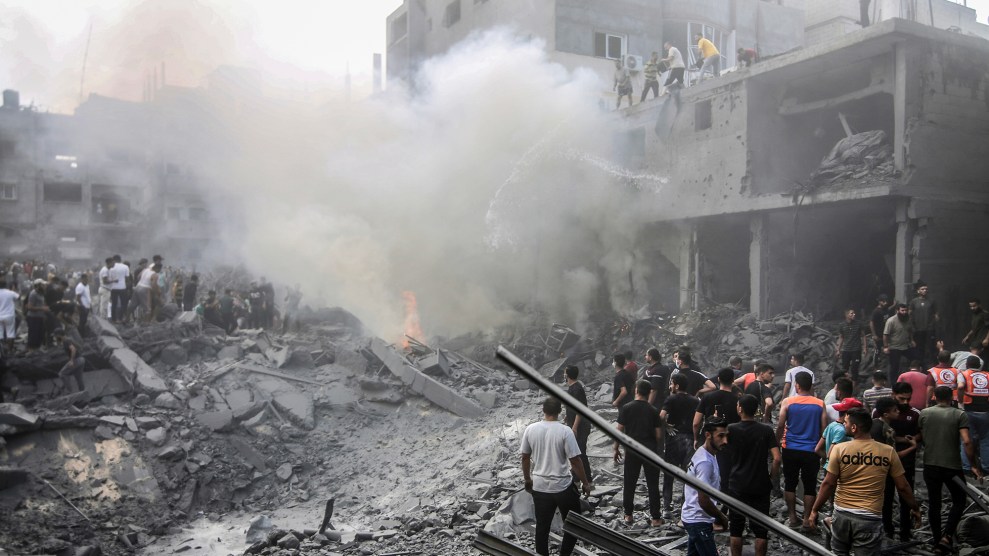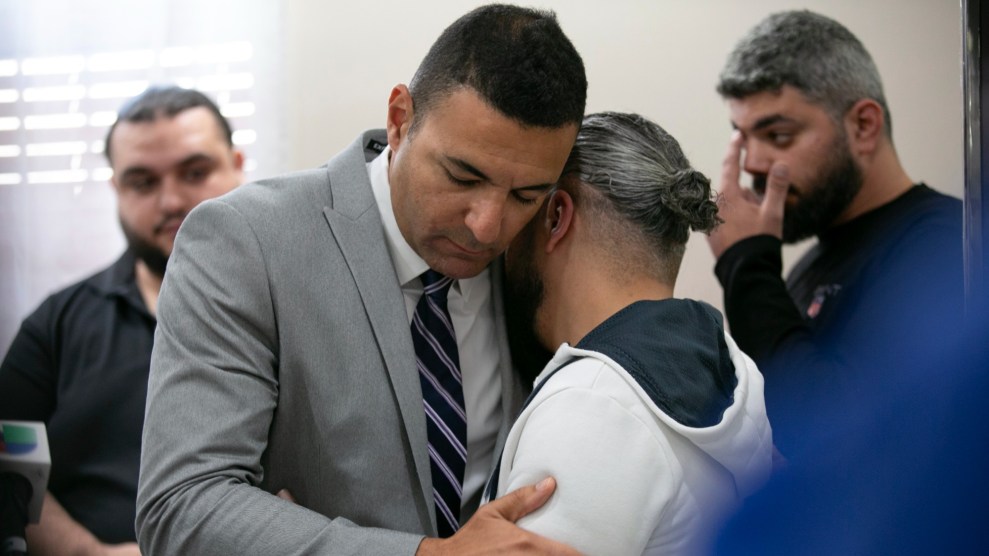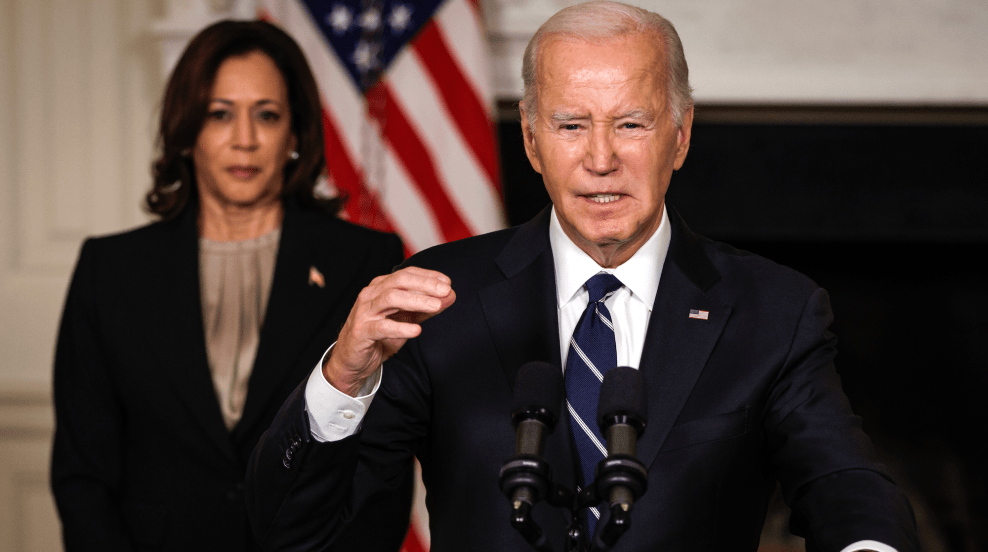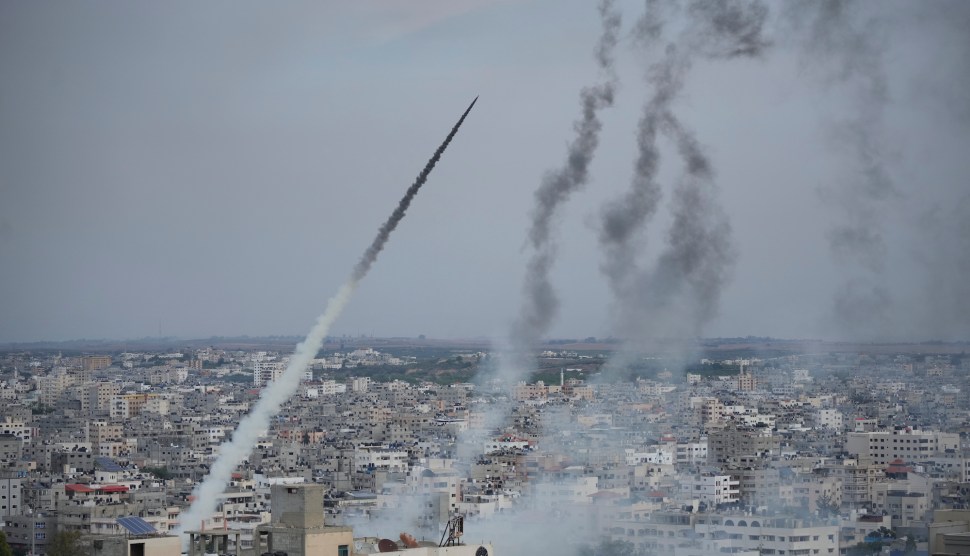
People extinguish a fire in the site of Israeli air strikes as fighting between Israeli troops and Islamist Hamas militants continues. Abed Rahim Khatib/picture-alliance/dpa/AP
In 2003, Haggai Matar made headlines as a teenager for refusing to perform mandatory service in the Israeli military. “They do war crimes and they expect us to keep silent,” Matar said at the time. “But we will not be silent. We will speak out against the occupation, even when we pay a price.” He spent two years in prison for being a conscientious objector and later became a journalist for Haaretz and other Israeli outlets.
Matar is now the executive director of +972 Magazine, a nonprofit newsroom run by Palestinian and Israeli journalists. Over the past two weeks, +972 has published essential on-the-ground reporting from Gaza and Israel, along with analysis that helps explain the long history behind the current war.
Matar and I spoke on Sunday about the more than 1,300 people killed by Hamas on October 7, and what he considers to be a criminal response to that attack by Israel. The interview has been edited for length and clarity.
You wrote your first article about the attack on October 7. How does what has happened since then compare to your initial expectations?
I think the scale of the disaster has become much more apparent. On the Israeli front, just more and more horror stories from after the battles ended and people started going back into the music festival arena and the towns that were taken over by Hamas—scenes of absolute carnage. Hundreds of young people or elderly people massacred all over the place. We’re really talking about communities that are decimated, that will never recover from this.
Since then, the attack on Gaza has started. Just one week into that assault, we have about the same number of Palestinians killed in the Gaza Strip. I’m not even counting the 1,500 Palestinians killed after having crossed the fence. Only in Gaza, over 2,000 people were killed. Over 700 children. [Health authorities in Gaza now say that the death toll has risen to more than 3,000.]
These are numbers that we’ve seen at the end of the worst of previous wars, and we’re just at the beginning. The fact that water and fuel and electricity have been cut off for two million people, and the humanitarian crisis that’s beginning there is just unfathomable and criminal.
It’s hard to be able to grieve with my own community and face parts of the global left that are celebrating the massacres as some sort of act of liberation for Palestinians. At the same time, facing Jewish leftists saying only what happened to Israel really matters, and this is no time to feel sorry for Palestinians, you need to push back against that as well. Adding all those layers of complexity, it’s frightening, it’s lonely, it’s terrifying.
You’ve emphasized the importance of seeing the attack in its broader context. What was the daily reality faced by people in Gaza before October 7, and how has it further deteriorated since then?
It’s way beyond just Gaza. There’s been an attempt by Israel since the disengagement in 2005 to create a political reality where there is no single Palestinian people. There has been this divide-and-conquer policy of having different Palestinian groups in different areas with different rights. It’s really important, when we talk about context, to not just talk about Gaza.
In the context of Gaza, there has been a very, very tough siege since the disengagement and since Hamas took over. It’s just become a matter of fact that nobody considered changing. We’re seeing unemployment consistently over 40 percent. Unemployment among young people is at over 60 percent.
It’s a very poor community that also every few years goes through one of these experiences triggered by something on either side, but always ending in mass destruction, devastation, death, and people wounded. That’s been the reality of this huge open-air prison. That’s been the reality of the West Bank military regime. Over the past year, settlers have been given free rein to attack Palestinians and set up new settlements without any kind of guardrails from the state and the army.
Most of the residents of Gaza are people who lost their homes in 1948. These are people who already have had to leave their homes in that war and now half of the population—over 1 million people—have left their homes in the northern strip. The history of refuge, constantly running away, and surviving wars is an essential part of that context.
Are there stories that have stuck with you about the consequences of Israel’s retaliation in Gaza?
They just keep on coming. The stories of several dozen families that were entirely wiped out by the bombing. Even the people whose entire family is, I wouldn’t say safe, but alive, just scrambling to figure out stuff. We have team members who ran away from home, tried to cross the border to Egypt, got to the border, and had the border checkpoint bombed by Israel as they were there. Now they are trying to figure out where is safe because even the roads to the areas that Israel said it wouldn’t attack are also being attacked.
They are looking for water and not finding any. Looking for the ability to talk to us because there’s no electricity, no batteries. Just day-to-day survival is impossible. This is, again, for people who are not wounded and not killed.
This is all happening under a far-right government that includes extremists like Minister of National Security Itamar Ben-Gvir. Even a former Mossad chief says Israel is subjecting Palestinians to a system of apartheid. How have the actions of this government helped lead to where we are now?
There’s everything I mentioned before about settlements and their expansion and the attacks on Palestinian communities, which also is not unprecedented. It’s an escalation of things we’ve seen before.
Also, the feeling Palestinians have of the dead end of the struggle. Any attempt Palestinians have used to try to get international support has been blocked in different ways. The BDS campaign is being outlawed in some US states, in the UK, and elsewhere. This is a nonviolent campaign for Palestinian rights.
Their attempts to get resolutions through in the UN are constantly blocked by the US, which keeps on funding Israel and offering this diplomatic umbrella. And Arab states are now switching sides and basically allying with Israel in US-brokered peace deals and normalization deals.
There’s the frustration of how the Israeli public doesn’t care about this anymore and doesn’t even talk about looking for a solution. I don’t think that frustration justifies the way Hamas attacked civilians in Israel. There’s no justifying that. But if we don’t look to history, we won’t be able to break out of this dreadful cycle.
In his speech last Tuesday, President Biden took a very pro-Israel line, although he has offered some qualifications over the weekend. What role do you see the US playing in contributing to or limiting the scale of the suffering caused by the Israeli response in Gaza?
The last time the US actually took an effective stand to somehow defend Palestinians was with George Bush, Sr. That was the last time that a US president actually said: You’re not getting any more aid if you’re building settlements, and if you won’t sit down to negotiate with Palestinians.
When Israel knows that basically whatever it is that it needs, it will get from the US, then people become accustomed to that—saying, you know, it doesn’t really matter if Biden said this on Tuesday and that on Saturday. He can say whatever he wants. As long as he keeps on allowing us to do whatever we want to do, words don’t mean much.
It doesn’t help that Biden says, I care about Palestinians. The disparity is incredible. The Eiffel Tower was lit blue and white. So was the Brandenburg Gate. Nobody ever does that when thousands of Palestinians are being killed, when women are being killed. It’s just not something you see.
What response have Israelis who are pushing for peace been getting in the past week from those on the right?
It’s not just the right. There’s a very prominent writer. He’s a leftist generally. He recently wrote we need to see a lot of Palestinians die right now. When you have someone like him saying that, you realize that voices against this attack are, unfortunately, really limited.
A journalist who is outspoken against the war came under a physical attack. There were dozens of people outside his house—trying to shoot fireworks at his house, trying to break into his house. He was eventually rescued by police. People chased the police car around town to get him. He’s in a safe house now. This is just for saying that he cares about Palestinians’ lives as well as those of Israelis. People do not have the bandwidth or the patience to accept any criticism of what’s happening in Gaza.
And also we’re afraid. For many years, the sense was that we don’t actually have to fear the annihilation of Israel. Now every day people are saying that this is the most Jews killed in one day since the Holocaust. The mentality is that we’re facing something akin to the Holocaust. And when that’s the case, then bombing Gaza is akin to bombing Dresden. You feel sorry for the people caught up. Maybe. But you feel justified because you have to. Because— Nazis. That’s where the public discourse is at.
An IDF spokesperson has said that the emphasis is on damage, not precision. A Likud Member of Knesset has called for another nakba. There are many more examples of similar rhetoric. Where might this end for people in Gaza?
I have no idea. I fear, and I hear Gazans fear, that all options are on the table. The scope of the carnage, the destruction really could be something we’ve never seen before. It’s just too dreadful to imagine. And I don’t know what that means for the future of Gaza. And I don’t know what that means for the future of all of us.
There are many Americans who have responded to the Hamas attack with a feeling that they need to support Israel right now. What would you say to them?
There’s something right about seeing what happened in the Israeli South and saying, “I want to support these people.” It’s a very natural and humane response. I just think we need to extend that response to Palestinians.
If people haven’t been following what Israel has been doing to Palestinians in the West Bank and in Gaza for decades, and what life in Gaza looks like, and what is happening to people in Gaza right now, then before you say, we’ll support Israel with whatever, you need to educate yourself. You need to understand what Israel is doing and how many people are killed.
One of the things that frustrates me the most is hearing reasoning on both sides that sounds like what the other is saying. When you hear Israelis say, “Look at what they did to us, they’re subhuman, and therefore, we are within our rights to do whatever it is we want to them.” Palestinians are saying the same. We’re willing to be immoral and pay the price of losing a little bit of our humanity and breaking international law because of what they’ve been doing to us. I think that’s a very dangerous and destructive way to go.
We have international law for a reason. It can’t be set aside because something terrible happened. International law about war is there for terrible situations. It’s not there to manage how people get along in their friendly, day-to-day lives. It’s how people manage in the most horrific situations to keep some form of humanity.
When one side has been allowed systematically to break international law—from building settlements to killing Palestinians to all sorts of things— you need to hold that side accountable. And not just cry out, and rightly cry out, when it’s happening to Israel.














